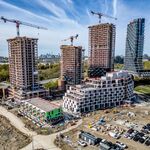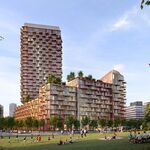Dichotomy
Banned
No one is claiming otherwise. However the maintenance requirements resultant from heavy auto usage are a lot higher than they would be if most people used transit.
Gotta laugh at that one: are the deep ruts at many of the bus stops in the suburbs from cars? Pharmacy/Eglinton have paths carved where the bus pulls over. And I suppose it is the car rails that cause the concrete on Dundas, College, Queen etc. to heave and require the roadway to be dug up (at considerable inconvenience and expense) every decade or so!
Trucks do far more damage to the roads than cars. Try getting the truck lobby to pay more fees! Good luck with that one. We can blame 'just in time' delivery for the factories (what are left of them) in the area that require truck delivery, rather than the much more environmentally friendly train delivery.
If the automobile disappeared tomorrow in some Telaxian plot, roads would still be unfriendly for cyclists (trucks!), pollution would still be an issue, and you would have to wait for 6 King streetcars to go by before being able to get on, instead of 3 or 4.
And TKTKTK, the 'agrarianopolis' remark was hilarious!




